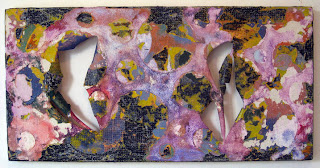Untitled, acrylic, sand & paper on canvas,
20 x 16", 2012
What are you working on in your studio right now?
Small intense freaky little abstract paintings. I'm in a show up now at Storefront Bushwick (through 3/11) and next opening at John Davis Gallery later in May.
Can you describe your working routine?
I generally spend three to
five hours at a time in the studio... usually four... it depends how many
paintings I have to work on. My studio is not at home and I don't do anything
else in this studio... no hanging-out or reading, there's no internet. When I'm
getting closer to a show there is more sit and stare time.
Can you describe your studio space and how, if at all, that affects your
work?
I have a sort of narrow room in a barn. It's only a hundred bucks a month although I just got a note saying I owe four hundred oops. I don't necessarily think that the space affects my work... although yeah if I had a different type of space, or an at-home space, results and habits might be a little different. Last year I was planning on having a nice summer outdoor setup on this farm I work on, but I ended up having an opportunity to go to Istanbul for six weeks... so maybe this year. It is isolated... I think three people visited my studio in three years.
Untitled, acrylic on canvas, 20 x 16", 2012
Tell me about your process, where things begin, how they evolve etc.
I order canvasses from Utrecht or Amazon.... making them myself is a pain, and I like how shallow these are, close to the wall... and also I guess because the quality is not that great they start to shred pretty nice. They are easy to handle and toss around, so light. I work on many paintings at once... they are not started all together but ideally are in different stages. First move on a new one is usually to paint the canvas something solid... or glue some colored paper circles to it... or take a piece of mesh and create a grid of colored sand or glitter... or make a couple small slices. Something to disrupt the blank canvas.
What are you having the most trouble resolving?
Do you experiment with different materials a lot or do you prefer to work
within certain parameters?
I think the former. I mean, I use the same materials repeatedly... but there is constant experimentation and discovery. I like to weird myself out.
Untitled, acrylic, sand on canvas, 12 x 24", 2012

.jpg)




I wonder if Martin has any concern for the archival quality of his materials... regarding his cutting of the canvas and gluing objects on to it. I saw a Rauschenberg exhibit not too long ago and sadly it seemed "old"... yellowy and flakey. Just wondering what the thoughts of other young artists are in regard to this issue. www.danielgalas.com
ReplyDeletehi daniel - no it isn't a particular concern but the paint is acrylic and the 'glue' is actually acrylic matte medium. the paper is good quality not cheap stuff. the sand is supposedly fadeproof and everything gets coated pretty well with matte medium. i wouldn't put these (or any painting) in direct sunlight, but other than that i think it's fine.
ReplyDeleteandre masson did a lot of pictures using colored sand btw.
I think sometimes the yellowing, the age, are a central part of the work... think of Kline's house paint works, decaying... sometimes, it is more important to get the work down, get it done, get it seen, and keep that spontaneity ... I think. I really think this is a fine series by Martin Bromirski, and I am glad for the interview, as well!
ReplyDelete